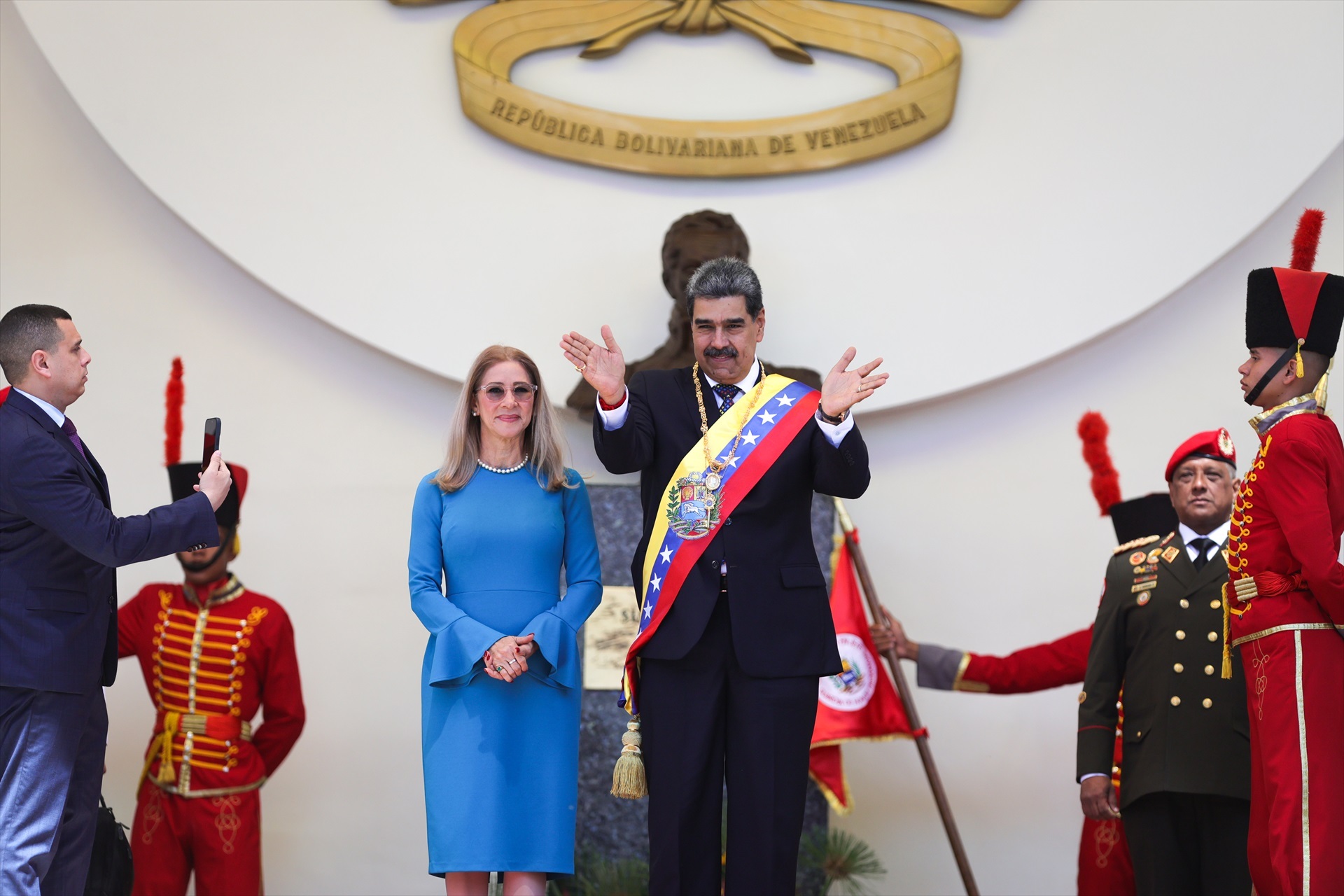"The Community is the way for Venezuela to emerge from the crisis"
- Cira Pascual Marquina and Chris Gilbert are two internationalist militants who are turning their backs on the Bolivarian process in Venezuela. The School of Paintings runs the Marxist political education television program, are teachers of the Bolivarian University of Venezuela and work with the common Venezuelans. They have visited Euskal Herria to publicize the campaign for El Maizal Komuna. We have taken the opportunity to meet with them to talk about the revolutionary nature of the commons, their achievements and practical shortcomings, as well as the “tension of collaboration” relationship between the government and the commons.

You have been living in Venezuela for thirteen years. What got you there?
The great C. Gilbert: Before we settled in Venezuela, we developed our militancy in a semi-anarchist semi-autonomous framework, we were close to zapatism... And Chávez came along. In my case, I thought about Chavez's satanization. “Look, there’s something real going on.” Before we took root in 2006, we made a couple of short visits and got in touch with Marxist sectors within Chavism. That chavism formed us.
What are they and why are the services implemented in Venezuela?
The great C. Pascual: It is key to understand that the bolivar project is a project of social democratization since its birth. Chavez already spoke in 1991 of leading democracy and direct democracy.
Tied to the Community, Chávez claimed in 2006 the construction of socialist society in Chávez. There are several steps in the construction of Venezuelan socialism. One is the formation of the party, but from the point of view of democratisation it is not so interesting. Another has been the creation of the Common Councils. In these spaces are organized between 50 and 300 families, through direct democracy they make decisions in assemblies in urban, school... The State is obliged to comply with what the community decides. It is important, but it does not affect the relations of production, it does not necessarily break capitalist logic. It's just a political transformation.
Are the next steps to take the leap to the economy common?
The great C. Pascual: In 2009, Chavez proposed a Community for political and economic reorganization in the Caribbean country. The Community is the sum of several common councils, usually ten or twelve, linked to a given territory. In the centre of the Comuna is the social property of all. The community decides in assembly what to produce, how, what to do with the surpluses. In these spaces other social relationships are developed. Wage exploitation is no longer a foundation. There is a democratisation of politics, including the economy, of society in general. And the idea is that it becomes a basic cell of Venezuelan society. The association of the atheists would create common cities, from there to the communal states (equal to our provinces), until reaching the State of Venezuela.
The great C. Gilbert: The bathrooms have their origin in indigenous communalism, as well as in previous experiments related to self-organization: community councils, technical tables of water... But what is common is the contribution to the construction of international socialism. It is based on the criticism of real socialism by Istvàn Mèszàros [Hungarian philosopher, 1930-2017] and Chávez. Mèszàrose distinguishes capital and capitalism: It may have a post-capitalist regime like the Soviet Union, but the metabolism of capital can last. It refers to the hierarchical and undemocratic organization of work, paid work ... The idea of Mèszàros and Chavez was that this metabolism had to change from the beginning, starting with the work center itself.
The great C. Pascual: We have all been Zapatistas and of course we support the Zapatistas, but Zapatism does not aim to build a socialist and popular state. Chavism does want to consolidate a bloc of people into power. It doesn't just want to build the conditions from the bottom, also from the top. State and toilets in return. Chavez claimed that the commons could not have socialist islands in a capitalist sea.
.jpg)
The relationship between leftist governments and their grass-roots or grass-roots movements is always complicated. The normal thing is that the bottom line is that there are more radical and more permissible positions in government. Does Venezuela show other experiences? The Toilet gives the impression that the Government is trying to radicalise the process and citizenship.
The great C. Gilbert: Many find it very difficult to understand the forms of organization of Venezuelans: it looks like a disorganized mass, but it doesn't, it has its own forms of organization. Chavez was a sort of vanguard that the Chinese people pushed from the bottom. Those who work to promote popular power often give up state power. But the most interesting experiments in the direction of popular power have been carried out with the support of the State. It is an interesting situation, although sometimes the relationship is antagonistic.
The great C. Pascual: Even at the best moments of the Bolivarian process, there was a tension of collaboration between popular power and the State of Government. But the framework for collaboration was very important. The toilet is also the self-organization of production, you need a workshop to produce, tractors, land… In those dimensions the protection of the State charges importancia.En
El Maiztal, for example, from 2008 onwards the villagers began appropriating land: the lands of the great owners, but also those that the State had not cultivated. There was a conflict between the State and the villagers. But the State had to go back through a law that in 2001 gave citizens the right to occupy land that had not been used. Later, in 2009, when the law of the commons was implemented, El Maizal used this tool provided by the state to reinforce himself. Confrontation arises when people’s self-organization is willing to accept the State but goes beyond it.
Some say that struggle and self-organization have borne fruit in the territories where they lived, but not in the others.
The great C. Gilbert: I would say that there are two days of greatest success: El Maiztal and El Panal in the January 23 district of Caracas. They both existed in practice before the law. In El Panadero, the name of a commune was taken before the law. Revolution is not made by laws, it is made by people.
Ten years have passed since the law of the Commons was passed. Beyond the intentions, what have the common in practice brought about?
The great C. Pascual: The assessment is absolutely positive. Not only because of the strategic revolutionary goal they set, but also tactically. Bathrooms respond to daily needs in a crisis situation. For example, the El Panal bathroom features a bakery, a textile factory and a dining room. Some of the surpluses are used for school food. It's a public school, in theory they have to give a meal, but now it doesn't come. The community is in charge of this, which has also reduced school absenteeism. Or the municipality of Altos de Lidise: they have collaborated with some Chilean doctors and are offering health care.
Is this the general reality of the commons?
The great C. Pascual: We are talking about the toilets that work. The real assets are few.
The great C. Gilbert: In Chavism there are several currents, and unfortunately the owner does not have much confidence in the commons. In his view, we must be very pragmatic in the face of the serious crisis and the continuing attacks. And they link pragmatism to capitalism, because that's the known path. But we believe that the solution to the crisis is common. In the 12 years of pre-crisis chavism, at the height of the oil price, capitalist relations were maintained. The welfare state developed, but the economy did not diversify, food sovereignty was not achieved and, in addition, the $500 billion fled the country. That's what capitalism brings, especially in a subordinate state.
Chavez succeeded in one thing: solidarity relations cannot be imposed by decree, people must be seduced, they must be persuaded. Imposing emancipation is a contradiction in terminis, but it is a mistake on the left. Chavez's mistake was to leave too many spaces for capitalism in the economy, and he ended up excluding services.
The great C. Pascual: Of course, no one wants a civil war or imperialist intervention. Chavez tried to push for a transformative popular project, but without clashing with the interests of the bourgeoisie. It was an era of economic growth. But the bourgeoisie is insatiable.
.jpg)
What can the bathroom experience be useful for the Basque Country?
The great C. Gilbert: The experience of MONDRAGON shows that the community, the cooperative network, can be very large. I think Mondragon's problem is that he ended up immersing himself in capitalism. For example, it has brought many productions abroad and created imperialist relations. Self-managed production doesn't have to be a small bar or a small restaurant. We should not associate the common with smallness, it would be to limit capacities and leave large production in the hands of capitalism.
The great C. Pascual: The Maizal has hundreds of hectares of land, in the pig farm there are between 2,000 and 10,000 pigs per time, it has many greenhouses… it is an agro-industrial production that meets the needs of the people. The goal must be to expand toilets, to gain territory.
Now you are in international campaign for the Commons and The Tenant.
The great C. Pascual: The campaign is called Seeds for Corn. It is sponsored by eleven associations and popular movements of the Basque Country. The contribution can be made by donating seeds or money. Euskal Herria has had a great internationalist sensitivity for years. When there are attacks on Venezuela, he leaves the street and is very grateful. But we live in a very difficult time, the solution is common and in order to face up to it we need material solidarity.
Cira, you are a militant of the Pakito Arriaran Foundation. How do you understand national liberation struggles?
The great C. Pascual: The Pakistan Arriaran Foundation is a foundation for solidarity between peoples, active round-trip solidarity. In Venezuela, many of the Basque members had to be exiled, and there is an awareness of the right to self-determination.
The great C. Gilbert: Classical Marxist traditions have defended the right of peoples to self-determination. As a struggle for democracy, but differentiating it from the struggle for socialism. Chavez made his contribution, understanding that socialism is the expansion of democracy. I believe that the fight for self-determination is also a step towards socialism.
The current situation requires a thorough analysis of what is behind titles, demonstrations, the manipulated dissemination of some facts, the dark concealment of others and the disguised propaganda of analysis in most mainstream media. The situation requires that superficial... [+]
Ten years have passed since 5 March 2013 and we cannot forget this gigantic commander of the peoples.
I don't really like the military. Especially in capitalist and career states. However, there are those who carry within the wishes of the people and have committed themselves to... [+]
























